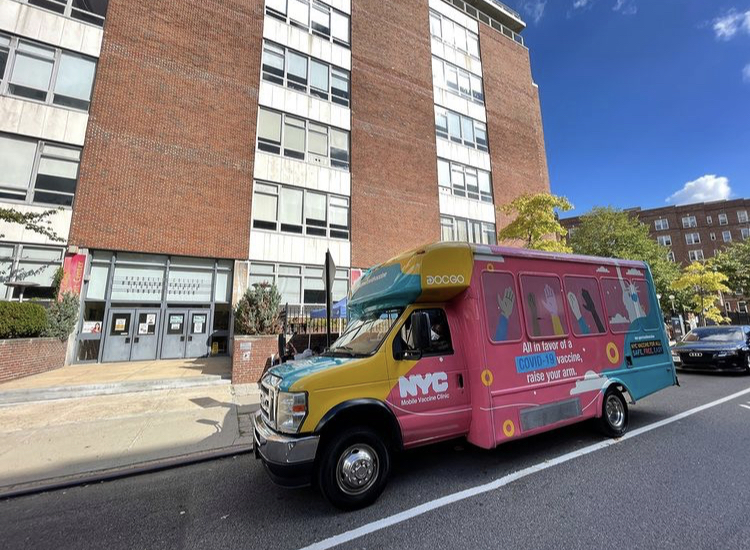

By Matt Hirsch
Reporting assistance by Gabriela Flores
Students lined up in front of the NYC Vaccine Van on Campus Road to get the shot before CUNY’s Sept. 23 vaccination deadline. The mandate applies to all CUNY students taking in-person or hybrid classes without a religious or medical exemption, as well as fully remote students who want to visit campus.
Some students were hesitant to get vaccinated but did so to avoid being withdrawn from their classes and losing financial aid. BC student Mohammed Ibrahim, explaining how his hesitancy began, said, “I guess COVID vaccine rumors because my family would tell me about the negative effects that happened. But also, from the news itself. Some people took it, they got sick or worse.”
Ibrahim, whose family member passed away due to COVID despite being fully vaccinated, cited a family history of high blood pressure and his worry of severe side effects. High blood pressure isn’t the only concern that vaccine-hesitant students have, though.
“I don’t know, I’m not really trusting of the vaccine. That’s the main reason why I waited this long to get it,” Brooklyn College student Jack Curtly told The Vanguard. “Specifically the Johnson & Johnson one, and the blood clots and all the other stuff that goes wrong with that vaccine.”
In April, Johnson & Johnson vaccine distribution was halted after six cases of blood clots were confirmed, according to the CDC. The six women who experienced clots also had a condition called thrombocytopenia, or low platelet levels. The CDC ultimately ended the pause, adding a warning label to the vaccine. Yale Medicine reports that Cerebral Venous Sinus Thrombosis, the type of clot experienced, is rare.
According to the CDC, vaccines are safe even for most health concerns.
“To date, the systems in place to monitor the safety of these vaccines have found only two serious types of health problems after vaccination, both of which are rare,” reads an excerpt from the CDC’s website. “These are anaphylaxis and thrombosis with thrombocytopenia syndrome (TTS) after vaccination with J&J/Janssen COVID-19 Vaccine.”
Anaphylaxis is experienced at a rate of two to six per million, according to the CDC. There have been 47 confirmed reports of people developing TTS after getting the Johnson and Johnson vaccine. The CDC notes that women under 50 should be aware of this side effect, despite its rarity.
Another concern of some students is the human body’s natural immunity once it is exposed to COVID-19. Quentin Gulbadia, a BC student who had COVID in March, noted he feels the antibodies developed from recovery should be taken into consideration by CUNY. “I don’t think natural immunity is factored in properly, to get checked if you have enough antibodies in your system for it [COVID],” he said about the university’s vaccine mandate.
People who have been infected once do have some level of immunity, and re-infection is rare, per a CDC study updated on Feb. 5. However, not everyone that was infected will be immune.
As the Delta variant remains COVID’s most infectious strain, the CDC reported that vaccines greatly reduce the risk of contracting the virus. Those who experience a breakthrough case are far less likely to be hospitalized than those unvaccinated. As of Sept. 14, Brooklyn College has two confirmed positive COVID cases out of 480 tested.
